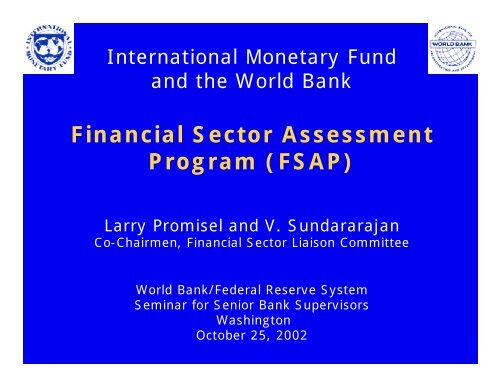
Financial Sector Assessment Program—Technical Note on Monitoring and Disclosure of Climate-Related Risks The International Monetary Fund’s (IMF) Financial Sector Assessment Program (FSAP) has developed a technical note on monitoring and disclosure of climate-related risks. This note provides guidance to financial institutions on how to identify, assess, and disclose climate-related risks. Key Points * Climate-related risks pose significant financial risks to financial institutions. These risks can include: * Physical risks: Loss of value due to extreme weather events or sea level rise. * Transition risks: Losses due to changes in policies and technologies that reduce the demand for fossil fuels. * Financial institutions need to develop a comprehensive approach to monitoring and disclosing climate-related risks. This approach should include: * Identifying and assessing climate-related risks. * Developing risk management strategies to mitigate these risks. * Disclosing climate-related risks to investors and other stakeholders. * The disclosure of climate-related risks allows investors and other stakeholders to make informed decisions about their investments. Recommendations The IMF recommends that financial institutions take the following steps to monitor and disclose climate-related risks: * Identify and assess climate-related risks. Financial institutions should use a range of tools and techniques to identify and assess climate-related risks. These tools and techniques include: * Scenario analysis: Assessing the potential financial impact of different climate change scenarios. * Portfolio analysis: Identifying the climate-related risks of different asset classes. * Stress testing: Assessing the resilience of portfolios to climate-related risks. * Develop risk management strategies. Financial institutions should develop risk management strategies to mitigate climate-related risks. These strategies should include: * Reducing exposure to climate-related risks. * Investing in green assets. * Developing climate-resilient lending practices. * Disclose climate-related risks. Financial institutions should disclose climate-related risks to investors and other stakeholders. This disclosure should include: * The results of climate-related risk assessments. * The risk management strategies that have been implemented. * The financial impact of climate-related risks. Conclusion The IMF believes that financial institutions have a responsibility to monitor and disclose climate-related risks. By taking the steps outlined in this technical note, financial institutions can help to protect themselves from the financial risks of climate change and support the transition to a low-carbon economy.This is a technical note on monitoring and disclosure of climate-related risks in the Netherlands. It was published by the International Monetary Fund on June 18, 2024 as part of the Financial Sector Assessment Program. The note summarizes the findings of a mission that visited the Netherlands in September 2023.This is a technical note on monitoring and disclosure of climate-related risks in the Netherlands. It was published by the International Monetary Fund on June 18, 2024 as part of the Financial Sector Assessment Program. The note summarizes the findings of a mission that visited the Netherlands in September 2023. The mission found that Dutch financial institutions are exposed to climate-related risks through both physical and transition risks. Physical risks are mainly represented by flood risk, while transition risks are mainly driven by the structure of the Dutch economy, including a significant exposure to agriculture. The Dutch authorities have made significant efforts to comprehensively respond to climate-related risks by identifying risk factors and analyzing their impacts, accompanied by strong policy initiatives aimed at mitigation and adaptation. The note recommends that the Dutch authorities continue to strengthen their efforts to monitor and disclose climate-related risks. This includes developing a comprehensive climate risk monitoring framework, enhancing data collection and analysis, and improving disclosure practices. The note also recommends that the Dutch authorities consider developing a national climate risk strategy to coordinate climate risk management across the financial sector.
FSAP Technical Note on Climate-Related Risks Monitoring and Disclosure The International Monetary Fund (IMF) has released a technical note on monitoring and disclosure of climate-related risks in the financial sector. The note provides guidance for financial supervisors and institutions on how to identify, assess, and mitigate these risks. Climate-related risks pose significant threats to the stability of the financial system. These risks include physical risks, such as extreme weather events and sea-level rise, and transition risks, such as the shift to a low-carbon economy. The technical note emphasizes the importance of supervisors playing a proactive role in monitoring and disclosing climate-related risks. Supervisors should: * Integrate climate-related risks into their supervisory framework and risk assessments. * Require financial institutions to disclose information on their climate-related risks and their plans to mitigate these risks. * Provide guidance and support to financial institutions on climate-related risk management. Financial institutions should also play an active role in managing their climate-related risks. They should: * Identify and assess their exposure to climate-related risks. * Develop strategies to mitigate these risks and enhance their resilience. * Disclose information on their climate-related risks and their risk management practices. The technical note also highlights the importance of international cooperation on climate-related risk management. The IMF encourages supervisors and financial institutions to share information and best practices on this issue. The IMF’s technical note is an important step towards enhancing the resilience of the financial sector to climate-related risks. By providing guidance on monitoring and disclosure, the IMF is helping supervisors and financial institutions to better understand and manage these risks.
Financial Sector Assessment Program—Technical Note on Monitoring and Disclosure of Climate-Related Risks
Related Posts
Kate Hudson Recreated Her Iconic How to Lose a Guy in 10 Days Scene During the World Series, and I Can’t Ignore the Fans’ Reaction to It
Kate Hudson isn’t just an award-winning one actress with famous parents; she is also a huge baseball fan. So it’s no surprise that she attended this year’s World Series to…
Software Catalog Unveils Array of Cutting-Edge Solutions for Enterprise Transformation
Software Catalog Unveils Array of Cutting-Edge Solutions for Enterprise TransformationSoftware Catalog Unveils Array of Cutting-Edge Solutions for Enterprise Transformation Technology is rapidly reshaping the business landscape, making it imperative for…